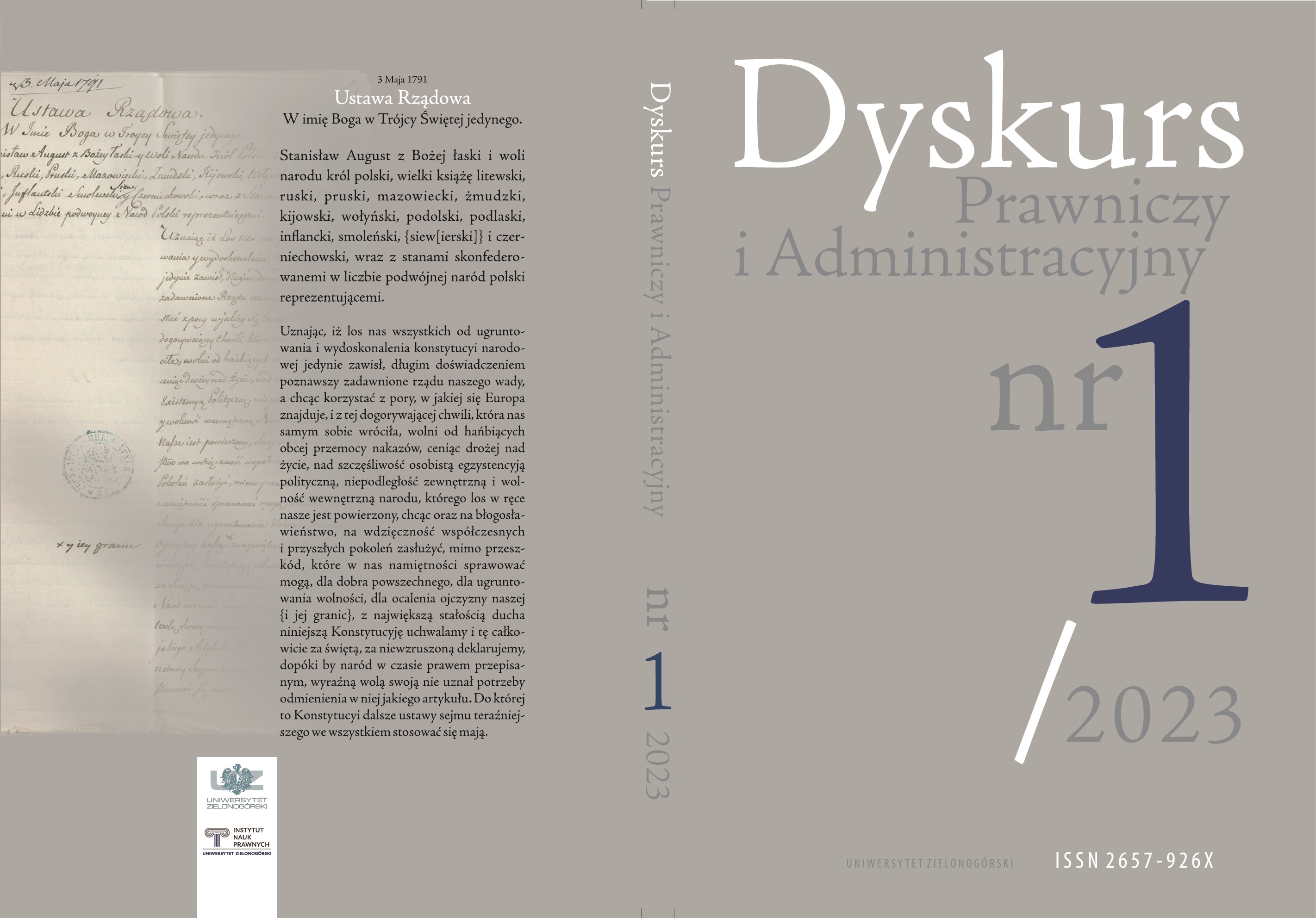Law of Nations from a Third World perspective
Keywords:
international law, Third World, subjectivity, history, human rightsAbstract
The article points out that law teaching should not only prepare for the practice of the profession but should develop the sensitivity of the humanist needed by every lawyer. Otherwise, so ciety will be condemned to a multitude of “pharmacists” who apply the law ruthlessly. International law, as a subject of general information, can play a special role in developing social sensitivity by presenting different approaches, theoretical-legal, and philosophical perspectives. One of the pro posals is the Third World Approaches to International Law movement, which offers a view of the Third World (which brings together post-colonial, also known as the South) on the law of nations. The materialistic vision of international law and its history, visible in the views of TWAIL representati ves, proposing a critical approach to law, related to New Approaches to International Law, or Integrated Marxist Approach to International Law, can be an interesting complement to lectures on the law of nations, e.g. in the area of its history, subjectivity or human rights, going slightly beyond the main stream current based on naturalistic and positivist narrative.
References
Alexandrowicz C.H., The Law of Nations in Global History, Oxford 2016.
Alvarez A., Latin America and International Law, „American Journal of International Law” 1909, vol. 3, z.2.
Anghie A., Fransisco de Vitoria and the Colonial Origins of International Law, „Social & Legal Studies” 1996, vol. 5(3).
Anghie A., Imperialism, Sovereignty and Making of International Law, Cambridge 2007.
Anghie A., The Evolution of International Law: Colonial and Postcolonial Realities, „Third World Quarterly” 2006, vol. 27, nr 5.
Balzer O., Nauka uniwersytecka a kolejność studiów w uniwersyteckiej nauce prawa, Warszawa 1921.
Cabaj J., Wpływ postmodernizmu na feministyczną teorię prawa, „Ius Novum” 2011, nr 2.
Carty A., Critical International Law: Recent Trends in the Theory of International Law, „European Journal of International Law” 1991, vol. 2.
Chimni B.S., International Law and World Order. A Critique of Contemporary Approaches, New Delhi/Newbury Park-London 1993.
Chimni B.S., International Law and World Order. A Critique of Contemporary Approaches, 2nd ed., Cambridge 2017.
Chimni B.S., Prolegomena to a Class Aproach to International Law, „European Journal of International Law” 2010, vol. 20, nr 1.
Chimni B.S., The World of TWAIL: Introduction to the Special Issue, „Trade, Law and Development” 2011, nr 3.
Chimni B.S., Third World Approaches to International Law: A Manifesto, „International Community Law Review” 2006, vol. 8.
Craven M., Introduction: International Law and Its Histories, [w:] Time, History and International Law, red. M. Craven, M. Fitzmaurice, M. Vogiatzi, Leiden-Boston 2011.
Elias T.O., Africa and the Development of International Law, wyd. zredagował i uaktualnił R. Akinjide, Dordrecht-Boston-London 1988.
Elias T.O., The Berlin Treaty and the River Niger Commission, „American Journal of International Law” 1963, vol. 57.
Eslava L., The Materiality of International Law: Vilence, History and Joe Sacco’s the Great War, „London Review of International Law” 2017, vol.5.
Fidler D.P., Revolt Against or From Within the West? TWAIL, the Developing World, and the Future Direction of International Law, „Chinese Journal of International Law” 2003, vol. 2(1).
Gathii I.T., The Agenda of Third World Approaches of International Law (TWAIL), [w:] International Legal Theory: Foundations and Frontiers, red. J. Dunoff, M. Pollack, Cambridge 2019, https://papers.ssrn.com/sol3/papers.cfm?abstract_id=3304767.
Góralczyk W., Sawicki S., Prawo międzynarodowe publiczne w zarysie, Warszawa 2006.
Koskenniemi M., The Gentle Civilizer of Nations. The Rise and Fall of International Law 1870-1960.
Hersch Lauterpacht Memorial Lectures, Cambridge 2007.
Lone F.N., Cross-Fertilization of Westphalian Approaches to International Law: Third World Studies and a New Era of International Law Scholarship, „Emory International Law Review” 2020, vol. 34.
Łazowski A., Zawidzka A., Prawo międzynarodowe publiczne, Warszawa 2003.
Muszyński M., Siła, norma, idea. Prawo międzynarodowe w ujęciu historycznym, t. 1, Warszawa 2019.
Okafor O.Ch., Critical Third World Approaches to International Law (TWAIL): Theory, Methodology, or Both, „International Community Law Review” 2008, vol. 10.
Okafor O.Ch., Newness, Imperialism, and International Legal Reform in Our Time: A TWAIL Perspective, „Osgoode Hall Law Journal 2005”, vol. 43, nr 1-2.
Okafor O.Ch., Re-defining Legitimate Statehood. International Law and State Fragmentation in Africa, Haga-Boston-London 2000.
Ramina L., Framing the Concept of TWAIL: “Third World Approaches to International Law”, „Justiça do Direito” 2018, vol. 32, nr 1.
Reynolds J., Empire, Emergency and International Law, Cambridge 2017.
Srogosz T., Podmiotowość prawnomiędzynarodowa w świetle Third World Approaches to International Law, [w:] Podmiotowość prawnomiędzynarodowa i jej współczesne aspekty, red. E. Cała-Wacinkiewicz,
J. Menkes, W. Staszewski, J. Nowakowska-Małusecka, Warszawa 2020.
Sunter A.F., TWAIL as Naturalized Epistemological Inquiry, „Canadian Journl of Law & Jurisprudence” 2007, vol. 20, z. 2.
The Oxford Handbook of the History of International Law, red. B. Fassbender, A. Peters, Oxford 2013.
The Oxford Handbook of the Theory of International Law, red. A. Orford, F. Hoffmann, Oxford 2016.
Theory and Philosophy of International Law. Philosophical Inquiries and General Theoretical Concerns, vol. I, red. A. Bianchi, Elgar 2017.
Third World Attitudes Toward International Law: Introduction, red. F. Snyer, S. Sathirathai Dordrecht/Boston1987.
wa Mutua M., The Ideology of Human Rights, „Virginia Journal of International Law” 1996, vol. 36.
wa Mutua M., What is TWAIL?, „Proceedings of the ASIL Ann. Meeting” 2000, vol. 94.
Watson I., First Nations, Indigenous Peoples: Our Laws Have Always Been Here, [w:] Indigenous Peoples as Subjects of International Law, red. I. Watson, Routledge 2018.
Zajadło J., Standardy praw człowieka – uniwersalne czy relatywne?, „Gdańskie Studia Prawnicze” 2014, t.XXXII.

Published
How to Cite
Issue
Section
Copyright (c) 2024 Tomasz Srogosz

This work is licensed under a Creative Commons Attribution-NonCommercial-NoDerivatives 4.0 International License.




